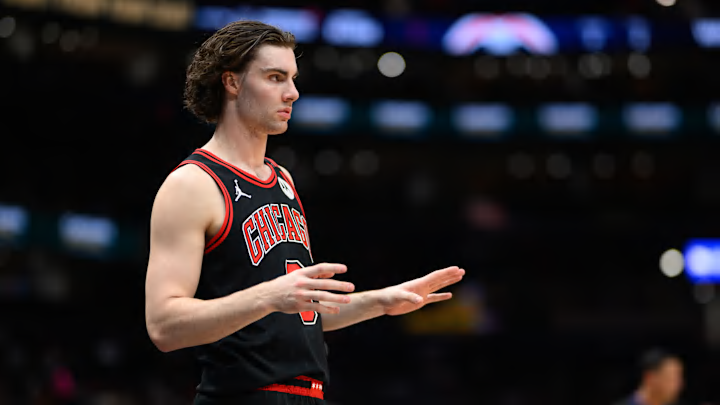At this point in the offseason, the NBA is typically devoid of notable storylines. Of course, summer basketball is being played, but besides that, the impending schedule release is perhaps the most anticipated upcoming event.
However, even though the free agency flurry has wound down, the league's most notable restricted free agents have yet to come to an agreement with their respective squads. Chicago Bulls' Josh Giddey, Brooklyn Nets' Cameron Thomas, Golden State Warriors' Jonathan Kuminga, and Philadelphia 76ers' Quentin Grimes all remain unsigned.
Josh Giddey and the Bulls remain distant in negotations
Nevertheless, the updates centered around each unsigned player are plentiful. Kuminga and the Warriors are miles apart on a new deal, Thomas might end up signing the qualifying offer, and the same goes for Grimes, even though the 76ers reportedly want him back on a multi-year pact.
Giddey, unlike his fellow unsigned comrades, has reportedly received a long-term offer from his respective team. According to NBA insider Jake Fischer, the Bulls offered Giddey a four-year, $80 million contract to kick off free agency.
Needless to say, Giddey rejected Chicago's offer. It's been well-documented that the 22-year-old is seeking at least $30 million per season. Dating back to the beginning of last season, it has been reported that Giddey sought his looming contract extension to mirror the one Jalen Suggs signed with the Orlando Magic—five years and $150.5 million.
Yet, solely because of the average annual value, the Bulls and Giddey remain in a stalemate. Chicago clearly wants to lock in Giddey as part of its core at a reasonable rate for the foreseeable future, and the floor general desires a $30 million price tag. But that doesn't mean compromising is impractical.
For starters, a three-year deal makes quite a bit of sense. The Bulls lock the 6-foot-8 guard into a new (mid-term?) deal, and Giddey is granted the opportunity to return to free agency when the salary cap is projected to be north of $180 million.
Still, even with a three-year contract, the annual salary discrepancy exists. $25 million seems to be fair—it's the middle ground between the Bulls' proposal and Giddey's asking price. On the flip side, it goes without saying that Giddey would prefer to secure a long-term, five-year contract worth roughly $150 million.
A three-year contract offer is the best compromise
But what if, instead of the Bulls' proposed four-year, $80 million contract, it were to be shortened, with the final figure staying the same? Thus, a three-year, $80 million pact with the average annual salary being $26.7 million per season.
$26.7 million isn't quite up to Giddey's preferred rate, but it's much closer than Chicago's $20 million proposal. Of course, in this scenario, the 22-year-old rakes in $70 million less than what Suggs will earn. But, as mentioned, Giddey can eventually secure a much larger sum, while Suggs is earning $26.8 million in 2028-29.
Moreover, the Bulls enjoy three more seasons of Giddey, without breaking the bank. In the grand scheme of things, $26.7 million isn't an otherworldly number for a starting point guard. $26.7 million would rank Giddey as the 19th-highest paid floor general in the NBA. Not bad for a player who demonstrated real All-NBA potential following last season's All-Star break.
Although there doesn't necessarily seem to be an end in sight, Giddey will re-sign a multi-year contract with the Bulls. At what cost? That we're unsure of. If anything, a compromise must be made, one that should slightly favor Giddey.
